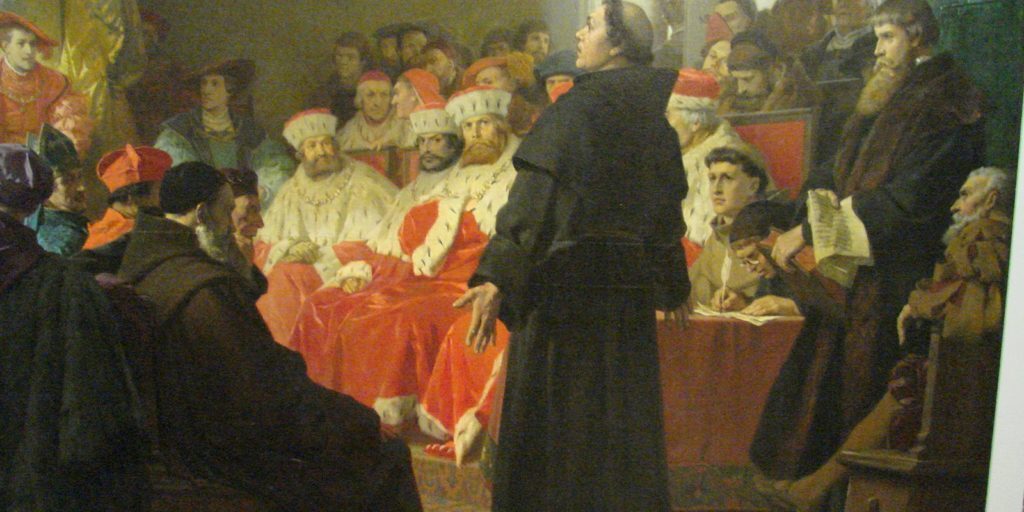
Catholic, Not Roman: Luther’s Ninety-Five Theses of Love for the Church
Some picture Martin Luther as a raging protester, eager to charge the gates of Rome and bring down the church. That caricature is far from the truth.
Luther was no sectarian or schismatic. He wasn’t trying to start a new church, nor was he attempting to divide the church, let alone bring Rome crashing down.
His intent was to reform from within, convinced Rome had turned to more modern innovations that betrayed the rich heritage of the church catholic (universal). We see that intent when Luther said at the start of his Ninety-five Theses that he was presenting them for public discussion but out “of love and zeal for truth and the desire to bring it to light.” Luther’s theses exhibited zeal, even serious consternation, but behind his bold discontent was a deeper motive—love. Love for God and love for his church.Indulgences—or to be more accurate, their abuse—galvanized Luther to write these Ninety-five Theses. Click To Tweet
Indulgences—or to be more accurate, their abuse—galvanized Luther to write these Ninety-five Theses.
The writing and posting of theses was anything but novel. It wasn’t the first time Luther had written some up for debate. Nor was Luther alone in this practice.
Many of his medieval colleagues had done the same. It’s likely Luther was imitating the examples of many who came before him. That isn’t to downplay Luther’s irritation, but he only intended to invite an academic dispute, not a revolt among the masses.
Luther sent the theses to the archbishop, Albert of Brandenburg, who presided over Johann Tetzel’s indulgence preaching. He also sent them to many of his friends. That move is revealing. Some wonder whether Luther’s ultimate aim all along wasn’t academic disputation but public, pastoral clarification on an issue as significant as salvation itself. His theses, with their pastoral angle, may indicate as much.
Repentance and the Penalty for Sin
Luther’s first thesis challenged Rome’s interpretation of Matthew 4:17. “When our Lord and Master Jesus Christ said, ‘Repent’, he willed the entire life of believers to be one of repentance.” Many assumed Jesus was commanding the sinner to “do penance” (the Latin is poenitentiam agite).
Luther was unwilling to read into Rome’s entire penance system, indulgences included, a simple command to turn from sin. He preferred the alternative translation, “repent.”
He wrote, “This word cannot be understood as referring to the sacrament of penance, that is, confession and satisfaction, as administered by the clergy.” Rather, it means “solely inner repentance.” Perhaps speaking from experience, Luther warned against “repentance” without external fruit: “Such inner repentance is worthless unless it produces various outward modifications of the flesh.”Luther was unwilling to read into Rome’s entire penance system, indulgences included, a simple command to turn from sin. Click To Tweet
When Luther addressed sin, he still assumed Rome’s distinction between the guilt of sin and the penalty of sin, believing the latter remains “until our entrance into the kingdom of heaven.” However, Luther discouraged appealing to the pope, as if the pope could somehow rid Christians of all the penalty of sin.
Furthermore, the sinner shouldn’t think he can find remission of his guilt if he isn’t truly repentant. Luther argued, “God remits guilt to no one unless at the same time he humbles him in all things and makes him submissive to his vicar, the priest.”
In 1517, Luther had yet to jettison Rome’s view of the priesthood. But he was irritated with priests, especially those who abused the concept of purgatory, noting, “Those priests act ignorantly and wickedly who, in the case of the dying, reserve canonical penalties for purgatory.”
It used to be the case, said Luther, that “penalties were imposed, not after, but before absolution, as tests of true contrition.” Not anymore. That worried Luther to no end; perhaps he talked to churchgoers who assumed that once they were absolved the penalties were nothing.
Purgatory and Indulgences
Luther was convinced purgatory was approached with all the wrong motives. The preachers of purgatory—like Tetzel—used fear rather than love to convey purgatory’s purpose. Luther wrote, “It seems as though for the souls in purgatory fear should necessarily decrease and love increase.”
He was persuaded that people everywhere were misinformed, even misled. When the pope granted a “plenary remission of all penalties,” he “[did] not actually mean ‘all penalties,’ but only those imposed by himself.”
Luther lamented, “Thus those indulgence preachers are in error who say that a man is absolved from every penalty and saved by papal indulgences.”
He claimed those purgatory preachers, like Tetzel, were proclaiming lies when they promised immediate release from purgatory at the purchase of an indulgence slip. He wrote, “They preach only human doctrines who say that as soon as the money clinks into the money chest, the soul flies out of purgatory.”
As the money chest increased, “greed and avarice” increased all the more. Luther reminded Christians that if they couldn’t even be sure their own repentance was genuine, how then could they be certain the penalty for all their sins was remitted by indulgences?
Often fiery, it seems Luther might well have flipped the indulgence tables upside down himself: “Those who believe that they can be certain of their salvation because they have indulgence letters will be eternally damned, together with their teachers.”
Fiery Language, Pastoral Heart
Luther’s strong language—damnation!—conveyed his pastoral disgust. Sinners rushed to the indulgence tables under the impression that if they had enough money to purchase the slip, they’d escape purgatory, regardless of whether they were repentant.
Some said an indulgence could “absolve a man even if he had . . . violated the mother of God” herself.
“Madness!” Luther cried. “What a total abuse of the penance system, as if satisfaction for the temporal punishment for one’s sins was for sale irrespective of genuine confession, irrespective of what sins one had committed.”
Luther objected with such vehemence because he was convinced cheap grace was offered at the expense of the heart’s sanctification.
Then Luther put forward a thesis that must have infuriated preachers like Tetzel: “Any truly repentant Christian has a right to full remission of penalty and guilt, even without indulgence letters.”
Preachers of “papal indulgences” who refused to exercise “caution” gave the laity the impression that other “good works of love” were less important. They were not, Luther replied. And like that, Luther undermined the entire system of indulgences, throwing into question the motivation of those selling them as well as their salvific value.
Catholic, Not Roman
Did Luther have an accurate understanding of the pope and his involvement in the indulgence affair?
Luther initially gave the pope the benefit of the doubt. He assumed the pope would put a stop to the selling and buying of indulgences if he only knew how they were abused. If “the pope knew the exactions of the indulgence preachers, he would rather that the basilica of St. Peter were burned to ashes than built up with the skin, flesh, and bones of his sheep.”In time, he came to see that in order to be truly catholic he could no longer be Roman. Click To Tweet
Little did Luther realize how wrong he was.
At this point in Luther’s journey, he didn’t reject the authority of the pope altogether but merely clarified papal authority, which he feared had been misappropriated by others. Luther brought down the pope’s authority to the level of the common bishop: “That power which the pope has in general over purgatory corresponds to the power which any bishop or curate has in a particular way in his own diocese or parish.”
Luther even raised questions about the keys: “The pope does very well when he grants remission to souls in purgatory, not by the power of the keys, which he does not have, but by way of intercession for them.”
The Ninety-five Theses reveal Luther was still a novice in his quest for reform. Beliefs he later abandoned were still present.
Nevertheless, the heart of his concerns was present and proved explosive in the right hands. In his mind, however, he was merely a medieval man trying to renew the church by retrieving its true heritage. In time, he came to see that in order to be truly catholic he could no longer be Roman.
This article was originally published at The Gospel Coalition, in partnership with Zondervan Academic and is adapted from The Reformation as Renewal: Retrieving the One, Holy, Catholic, and Apostolic Church by Matthew Barrett (Zondervan, June 2023).

